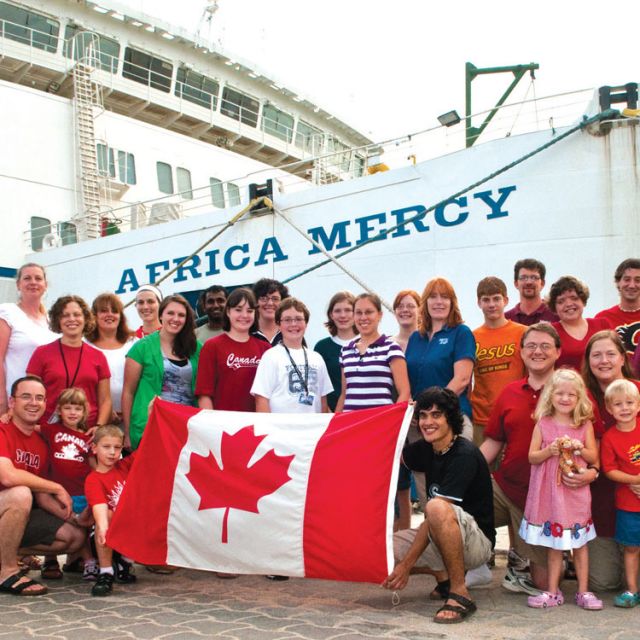Last year alone, through Mercy Ships Canada — part of the Mercy Ships International family, which was founded in 1978, followed by its Canadian arm 11 years later — 134 Canadians served aboard the Africa Mercy, doing everything from cutting hair to removing tumours.
“There are jobs for pretty much anyone and each job has sort of a minimum time commitment,” said Tim Maloney, Canadian national director. “The example we use for sort of a long-term time onboard is Dr. Gary Parker, who is the head of medicine on the ship and maxillofacial surgeon, who went to the ship for three weeks 27 years ago.”
Stretching 152 metres with a 23.7-metre beam, the Africa Mercy is the world’s largest nongovernmental hospital ship. Able to house 474 at sea for up to 12 days, the Africa Mercy contains six operating theatres and a 78-bed ward.
On board the crew is able to provide what Maloney referred to as transformative operations such as dental work, the removing of benign tumours and cataract surgery, as well as most other day surgeries.
“There is pure joy when somebody sees we can fix them,” said Maloney. “We (also) have a palliative care unit for those who come for screening and we know they are in the last stages of their life. We can assist and help prepare them for the end of their life.”
Mercy Ships International was founded in 1978 by Deyon Stephens and her husband Don.
Although the Stephens were in their 30s when they originally purchased an Italian cruise liner for its first floating hospital, the idea began in the Bahamas while the couple, then in their late teens, were on a mission trip.
“They were struck by a hurricane while they were there and they hunkered down in an old hangar. They prayed together about what they could do for their safety,” said Maloney. “One of the young women who was with them said wouldn’t it be interesting if there was a hospital ship that could come to this community, this country, after the hurricane left to help the people.”
The other major influence, according to Maloney, was Blessed Mother Teresa. Don met the late founder of the Missionaries of Charity and shared the vision of Mercy Ships with her during a visit to Calcutta. She encouraged him, saying it would give a voice to their disabled child John Paul by helping those in desperate need.
“The nature of this particular organization is that we are going to help the forgotten people,” said Maloney. “Our mission, the mission of Mercy Ships, is following the 2,000-year-old model of Jesus to bring hope and healing to the forgotten poor.”
And that’s exactly what Canadians, along with volunteers from more than 40 different nations, have been doing onboard the Africa Mercy since she first cast off in 2007.
Currently Mercy Ships is expanding its capital development projects, which traditionally built schools, long-term clean water stations and taught sustainable agriculture, with the construction of a maxillofacial — jaw and face region — clinic. Future staff are also being trained by Mercy Ship medical professionals.
“When we leave they will have the surgical equipment and the anesthetic equipment to continue to do what we’ve taught them to do, which is more cleft palates and lips,” said Maloney.
This specific project is entirely funded by Mercy Ships Canada, which collects about $1 million annually through donations.
“At least 95 per cent of the money received in Canada comes from individual people who support our cause or who are supporting a particular project which may be an individual serving,” said Maloney. “The largest gift we received in Canada last year was $40,000 so we don’t get big chunks of money from anywhere.”
Companies such as Johnson & Johnson, Alcon Canada and Vancouver’s Coastal Contacts also support Mercy Ships Canada by donating medical supplies.
Maloney said the amount yielded in donations each year highlights the biggest challenge.
“Limited awareness is one of our big limitations in what we can do.”
Visit www.mercyships.ca.


